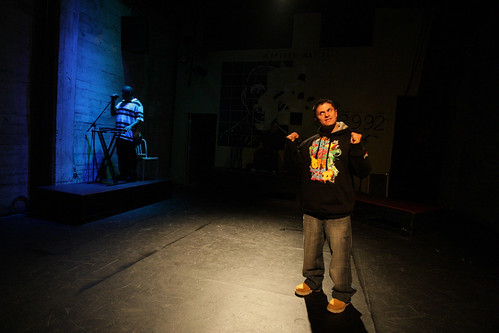EXTENDED AGAIN THROUGH DEC. 7

Keith Pinto (left) and Dan Wolf star in Wolf’s adaptation of the Adam Mansbach novel Angry Black White Boy at San Francisco’s Intersection for the Arts. The dynamic production features live music, rap, dance and old-fashioned storytelling. Photos by Evan Loewy
Music, beats, movement make `Angry’ a joy
«««1/2
For all of its form crunching and boundary pushing, Angry Black White Boy rises or falls on the strength of its storytelling.
For most of its two hours, Dan Wolf’s stage adaptation of Adam Mansbach’s novel tells a fierce, funny, fascinating story that cuts to the core of what we talk about when we talk about race in this country.
There’s satire and sincerity in ample supply, and this dynamic Campo Santo/Intersection for the Arts production, directed with sharp focus and experimental glee by Sean San José, is compelling as it is entertaining.
Mansbach’s narrative, which lacks only a satisfying ending, is augmented by fluid sound and movement that make the story feel like dance, poetry and music without ever detracting from the forward motion of the plot and the characters’ trajectory.
“The question is not how I got here but how you all didn’t,” says Macon Detornay (played by Wolf), a white Jewish kid from the Boston suburbs who has fully immersed himself, body and soul, in the world of hip-hop. He’s so outraged by the tacit level of racism in the U.S. that he begins to act out. A Columbia University student, Macon supports himself by driving a cab. And when a “typical white devil asshole” gets into the back of the taxi, Macon robs the man of his wallet and his dignity.
The vigilante robberies continue because all the victims report that the offending driver was black. After the inevitable arrest (when Macon insists that his latest victim note the actual color of his white skin), Macon becomes something of a folk hero and media darling/punching bag as he denounces white people’s institutional, economic and social privilege through something he calls the Race Traitor Project.
 Like so many rise to fame stories, once the protagonist hits the peak of celebrity, things get less interesting. Aside from some excellent re-creations of talk show appearances, Macon’s story sort of implodes rather than explodes.
Like so many rise to fame stories, once the protagonist hits the peak of celebrity, things get less interesting. Aside from some excellent re-creations of talk show appearances, Macon’s story sort of implodes rather than explodes.
But the storytelling along the way crackles with energy that comes from the fusion of mostly live music (performed by Tommy Shepherd, Keith Pinto and Myers Clark, all of whom are also actors) – a blend of hip-hop, rap, beatbox, doo-wop, gorgeous harmonies — and incisive movement devised by Pinto, who is a joy to watch glide around the small Intersection for the Arts stage.
The story also takes some surprising turns. Part of Macon’s rage against white people stems from his heritage, namely his great grandfather, Cap Anson, the guy largely responsible for getting African-Americans banned from major league baseball. As a sort of attempt to make amends, Macon befriends the great-grandson of a black ball player who was one of the last to leave the league.
This historical detour – the baseball stuff is true – gives the enormously likable Shepherd the chance to play Moses “Fleet” Walker, the player who held on to his dignity to the very end, and to create a rich musical riff inspired by Fleet to the effect of “you can’t keep running away.”
There’s also a very funny late-night encounter with he People’s Cooperative Guerilla Theatre, who stage an impromptu version of Ibsen’s A Doll’s House with a startled Macon “starring” as Nora, and an astute scene set in the classroom of a distinguished “academic gangsta” professor who happily apologizes for anything untoward in hip-hop.
As Macon’s friends Nique and Andre, Shepherd and Clark, respectively, offer sharply drawn performances full of humor and grounded realism. And as all of Macon’s victims, as well as a series of talk show hosts, Pinto is equally as effective but in a more stylized comic way.
The excellent quartet of actors fuses sound, movement and storytelling to create a uniquely theatrical experience. This is a true ensemble endeavor, and that’s the ultimate joy of Angry Black White Boy.
FOR MORE INFORMATION
Angry Black White Boy continues through Nov. 30 at Intersection for the Arts, 446 Valencia St., San Francisco. Tickets are $15-$25 on a sliding scale. Call 415-626-3311 or visit www.theintersection.org.
